Where sustainable farming, cutting edge technology and smart investing converge
By Ryan Noik 6 December 2021 | Categories: feature articles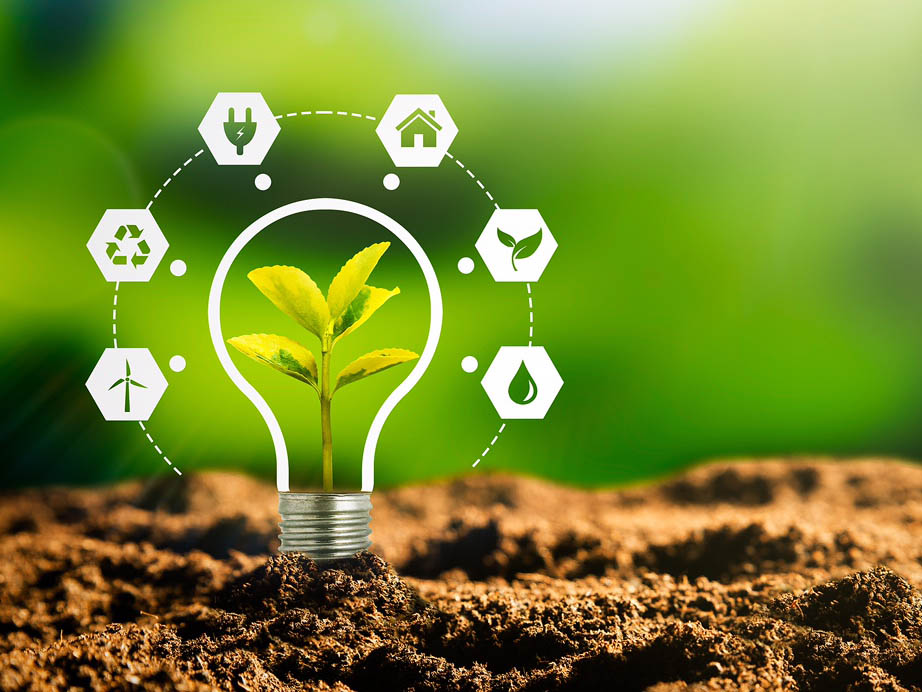
While farming and technology may seem like polar opposites, at a recent event in Pretoria, financial services provider Fedgroup showed how the two arenas, along with smart financial services, could blend together to create a whole that is greater than the sum of its parts.
The reason for the event was that Fedgroup has just launched a new opportunity for its investors who can buy into sustainably grown lettuce and invest in them via its Impact Farming platform. The lettuce joins existing crops such as macadamia nuts, blueberries and moringa trees, which are sustainably farmed by Can-Agri using vertical farming. The genius of the idea is that it enables investors to easily purchase a stake in sustainably grown crops, (which I can attest taste incredible), while the farming is done using the latest technologies to maximise its yield.
Because the crops are farmed without pesticides or some of the other chemicals which our food is often treated with, the difference in taste is significant. This makes the crops, exported to the international market, much more desirable.
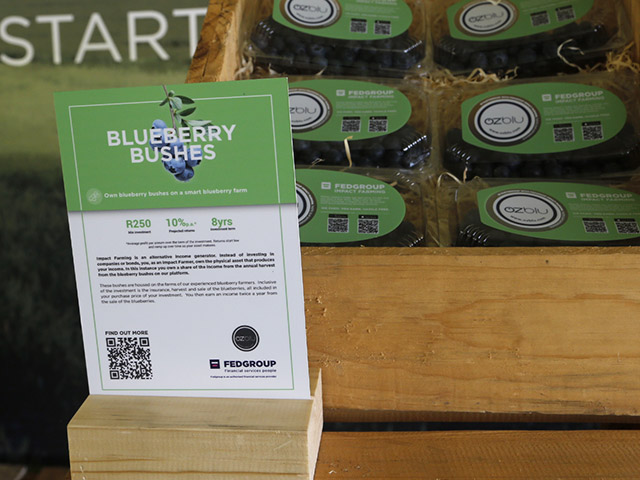
Apparently blueberries aren't just good for your health, but potentially can be for your bank balance as well.
A seed is planted
Grant Field, the CEO of Fedgroup, explained that the idea for its Impact Farming offering was born from looking at the intersection of technology trends such as IoT, machine learning, blockchain, peer to peer lending and human trends, such as sustainability, climate change, and a need to be environmentally conscious.
Each of these trends, he explained, had a part to play. IoT brought the ability to garner lots of data cheaply, machine learning enabled that data to be processed for value added insights, peer-to-peer brought together people in different fields for a common cause.
Another key component is the fact that the world is now more interested in sustainable energy – and for good reason, due to climate change and the concerns around how this will affect food supplies. As well, he explained, as the prices of IoT sensors have dropped significantly, it has become more possible to link sensors that measure humidity, temperature and a variety of other critical metrics with very little power needed. This set the stage to make something genuinely innovative.
That is where Impact Farming comes in. It began in 2018 and enabled consumers to make a once-off investment in a blueberry bush, beehive or solar panel on a sustainable farm and earn income from a portion of the sale of the harvest. It subsequently expanded to include macadamia nuts and Moringa trees, whose seeds and leaves are prized for their use in natural medicines. Each of the different products have different lifecycles as to when investors can anticipate a return.
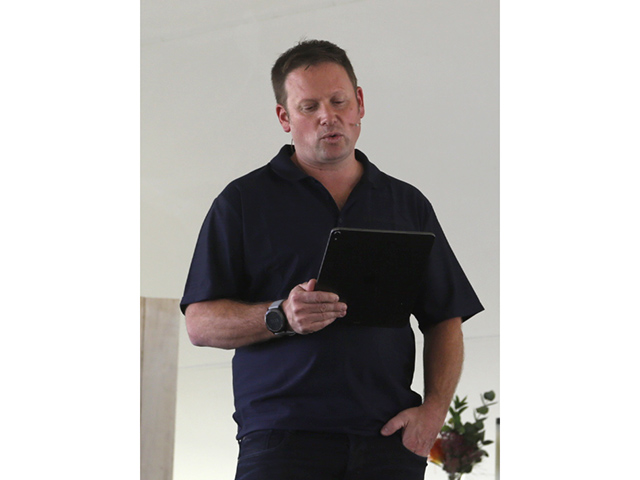
Grant Field
Growth happens
The most recent addition is to the platform is the vertically farmed lettuce stack, an investment in which will cost R7 000. The returns are expected to yield an estimated 14% on average per year, over the 7-year investment term. Returns are calculated on an internal rate of return across the life cycle of the asset
The lettuce is planted in vertical stacks that span six meters with 82 plants in each stack. Water is recycled and repurposed and great care has been taken to minimise its carbon footprint.
Contrast this to another technology-fueled investment mechanism, cryptocurrency trading, which has come under fire of late for having a very large carbon footprint. Where it is notoriously volatile, Field reassures that Fedgroup’s approach has been structured to be both profitable and sustainable.
“Since our launch three years ago, our average internal rate of return across our three assets has been consistent,” he noted. The success of the returns on the Impact Farming platform, explained Field, have been because of the business’ hands on approach to each asset.
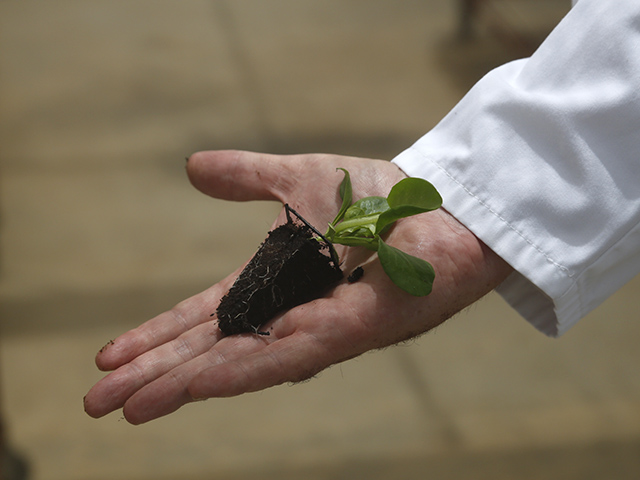
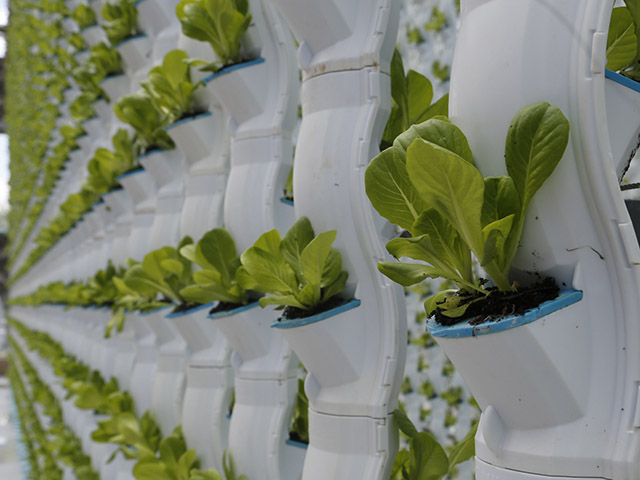
Resilience to Risks – and Reaping Rewards
“We have designed a comprehensive process that includes a vigorous due diligence on each asset to ensure that it meets our requirements as a stable investment,” said Field, “We have learnt a lot along the way and have refined the model to now be able to scale even more,” he elaborated.
As with any investment products – and agricultural ones at that – there are risks involved, but Field reassured that the business works closely with its partners to mitigate these risks. In fact, Impact Farming has already proven its resilience in the face of the unexpected.
“Last year we had two Black Swan events where frost, a one in a hundred-year occurrence, affected a large portion of the blueberry farm. But we were able to recover and still pay out a return to our investors,” he noted.
Adding an extra layer of security to the investment is the aforementioned use of technology. Thanks to the use of IoT, Can-Agri is able measure in real time that the temperature is correct, that the levels of humidity are what is required and be alerted if the balance needed is adversely affected.
This creates an early warning system that enables them to respond quickly, and it also provides historical data over time as to how well the investment is faring.
Francois van der Merwe, 2nd CEO at CAN-Agri Vertical Farming, explains some of the process behind vertical farming at its farm in Pretoria, South Africa.
Doing good, and doing well
Field explained that, because Impact Farming is based on real farming activities, profits start off low and ramp up over the full time of the investment.
He offered the example of a small blueberry bush that starts out producing just a few berries but as it matures, produces more, and an investor’s increase in returns happens at the same rate. Some of the assets are harvested once or twice a year while others are harvested monthly and give returns accordingly.
“Globally investors are becoming more discerning about what they are investing in. Increasingly they want to know that the companies they are supporting and where they are putting their money all make a positive contribution and are part of a sustainable ecosystem of people and planet, without compromising financial returns,” he noted.
The CEO of Fedgroup in South Africa, Grant Field, explains what investors are looking for, and just as importantly, what they aren''t.
Investment bears fruit – and vegetables
Increasingly environmental, social and corporate governance are gaining traction in South Africa. The problem with this, according to Field, is that companies are given a score based on doing less harm rather than on consciously and practically doing good. “With impact farming we wanted to ensure we are making a positive impact on people and planet,” he stressed.
“Thirty one years ago Fedgroup was founded on the simple ethos of putting people before profits. We have always believed that making an honest, fair profit can be achieved while still offering customers the bulk of the value. With impact farming we help our customers and our investors to do good while doing well financially too. This is done in a way that is easy to access, simple to understand and where investors are in touch with their investment. We believe this is the way of the future,” he concluded.
Most Read Articles

Have Your Say
What new tech or developments are you most anticipating this year?



